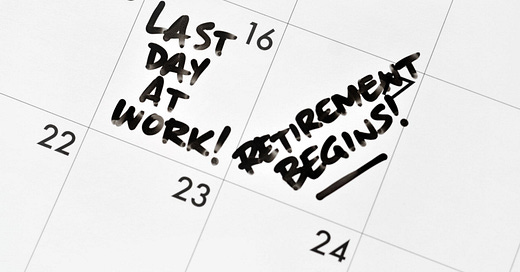
Setting your retirement date: Some smart ideas
When you’re finally choosing your retirement date - the date when you walk out of your full-time or part-time job for the last time, there’s a few clever opportunities to be aware of.
When you’re finally choosing your retirement date - the date when you walk out of your full-time or part-time job for the last time, there’s a lot of little things to consider.
And, if you’ve been working for one employer for some time and are eligible for long service leave, or, the Christmas or Easter holidays are approaching, the date you choose to retire can quite sizeably impact how much money you leave on the table. So when you pick that date it makes sense to consider a few things, with the goal of minimising your tax and maximising the money you take home with you.
Now remember, I’m neither a tax adviser nor a financial adviser, I just speak in fact and point to things so you can do more personal research yourself. So if you want to get help interpreting it to your situation - speak to an accountant or financial advisor yourself and ask the questions.
Here’s my tips.
Maximise your tax free threshold income and lower tax bracket income
Currently, in the 2023-2024 financial year, you can earn up to $18,200 without paying any income tax. If you're planning to retire but still have some capacity left to earn at low tax levels, it's worth making the most of this tax-free threshold. Even if you earn more than $18,200, the income between $18,201 and $45,000 is taxed at a lower rate (19%). Therefore, working a bit longer in the year could still be advantageous, allowing you to add more money to your retirement savings with minimal tax impact.
From July 1, 2024, the Stage 3 tax cuts will come into effect, changing the tax brackets. While the tax-free threshold remains at $18,200, the income between $45,001 and $200,000 will be taxed at 30-37%.
If your earnings fall within this range, it might be worth considering delaying your retirement until after July 1, 2024, to take advantage of the lower tax rate. However, it's crucial to balance this potential tax benefit against your life choices and retirement goals. Always consult with a financial advisor to tailor decisions to your specific situation.
Strategically use any long service leave
If you're fortunate enough to have accrued long service leave, consider taking it before your official retirement date rather than getting paid out for it. People do this for three reasons:
Continued salary and superannuation contributions: During the long service leave period, you continue receiving a normal salary, and you also receive superannuation contributions on that salary, effectively increasing your overall retirement savings. If the leave were paid out as a lump sum, the superannuation component might not be included.
Enjoying a break while building savings: You can take a well-deserved break from work while still building up your nest egg. Additionally, you may remain insured for Total and Permanent Disability (TPD) and income protection if your company provides these benefits during your leave period.
Accruing additional leave: During your long service leave, you may continue to accrue annual leave and sick leave which would not have been paid out. Annual leave can be paid out when you finally retire, adding another boost to your savings.
Time your retirement carefully around holidays
When planning a retirement date, think about retiring after the big seasonal holidays rather than before. Many people choose to retire after the Christmas or Easter holiday periods to maximise the holiday pay and extra benefits that come from being employed during them. It makes sense to maximise the money they take home, simply by delaying retirement a week or two.
Ultimately, it’s worth looking more carefully at the financial/tax year-end opportunities, long service leave, holiday periods, and upcoming tax changes when you’re thinking about retiring. You don’t have to optimise everything in life, but if there’s easy changes that make a few thousand dollars difference - they might just be worth making.





